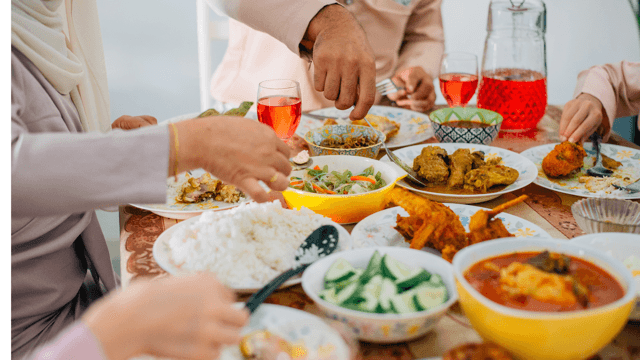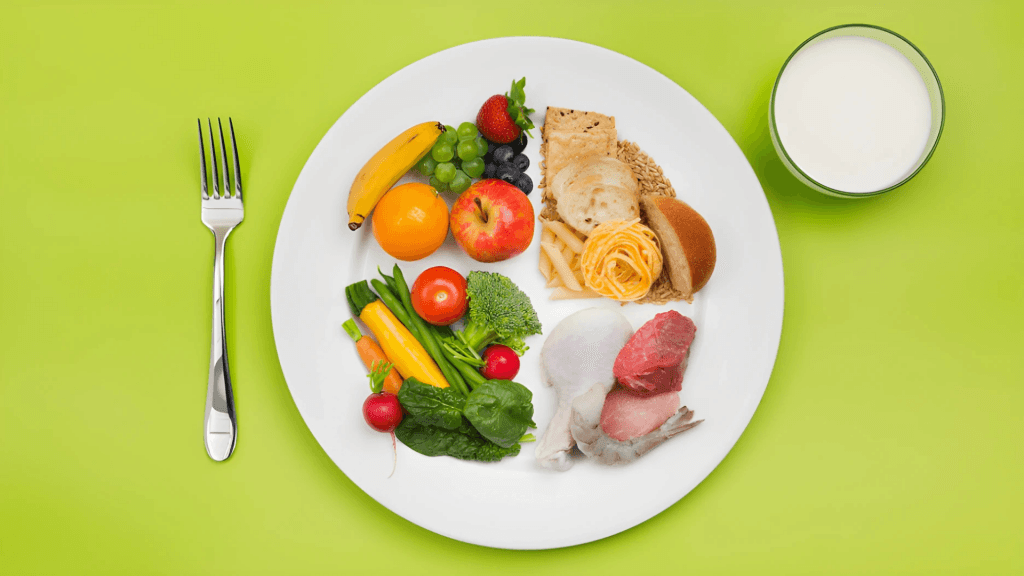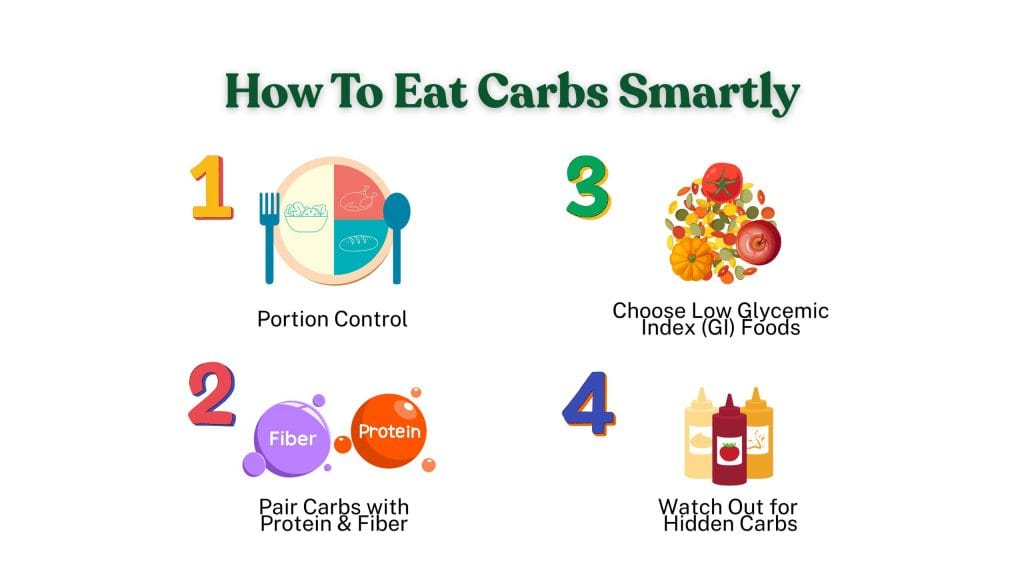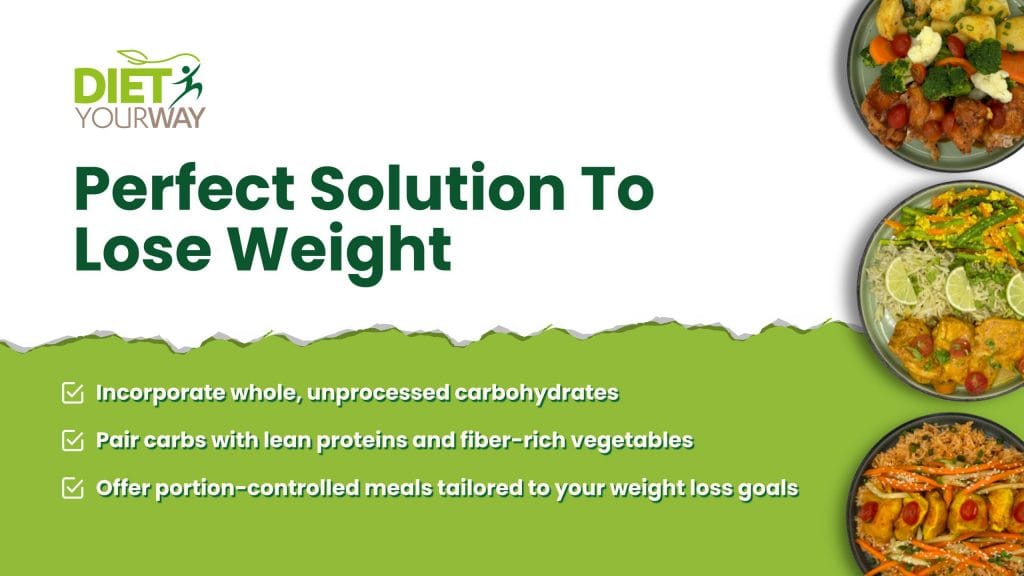Carbs Are Not the Villain in Weight Loss

If losing weight feels like a battle, many people point fingers at carbs as the culprit. But if cutting carbs seems to zap your energy, leave you craving your favourite comfort foods, or make social meals stressful, you’re not alone—and that’s because carb restriction isn’t the whole story.
Here’s the simple truth: Carbs don’t make you gain weight.
What really matters is your overall calorie balance. Whether your calories come from carbs, fats, or protein, weight loss happens when you create a calorie deficit — meaning you burn more energy than you consume.
Eliminating carbs or any single food group not only makes eating stressful, it can also backfire in the long run. In fact, carbs when chosen and balanced properly are a powerful tool that helps you stay on track, feel good, and keep going.
The Real Role of Carbs: Fuel for Your Body and Mind
Think about a typical busy day. You wake up full of plans, your mind buzzing with tasks, and your body ready for action. Where does the energy to power all that come from?
Carbs.

Carbohydrates are not just the primary energy source for your muscles, they’re also essential for every other organ in the body including brain. When you skip or drastically eliminate carbs, it’s like running your phone on low battery mode—things just don’t work as well.
You may feel tired, irritable, or unable to focus, which makes it tougher to stay motivated to exercise or focused.
It’s also play a vital role in keeping you full and reducing cravings. Foods rich in complex carbohydrates promote satiety, helping you feel satisfied longer and preventing the overeating or bingeing that often undermines weight loss efforts. This leads to better adherence and makes fat loss sustainable over the long term.

And let’s be real—food is more than fuel, it bring comfort and joy. In Malaysia, fragrant rice, hearty noodles, soft bread and other carb-rich foods carry tradition, comfort, and community. Let’s not forget culture—especially in Malaysia, where carbs such as rice, noodles, and roti are not just food but a part of tradition and community.
Completely cutting out carbs can make social eating difficult and reduce long-term adherence.
What Actually Matters for Losing Weight

Instead of focusing on cutting carbs, focus on these key principles:
i. Calorie Deficit
Weight loss happens when you burn more calories than you eat. No need to eliminate entire food groups, portion control is key.
You don’t need to cut out entire food groups like carbs or fats — just be mindful of your portions and total intake.
ii. Smart Carb Choices
Focus on complex carbohydrates instead of simple or refined carbs. Complex carbs are digested more slowly, helping to manage hunger and blood sugar levels.
Choose more of these complex carbs:
- Whole grains (brown rice, whole grain bread, oats, quinoa, barley)
- Legumes (lentils, chickpeas, kidney beans)
- Vegetables (cabbage, broccoli, carrots)
- Fruits (apples, pears, berries, with the skin)
Limit these simple/refined carbs:
- White bread, pastries, sweetened cereals
- Sugary drinks, desserts, and candy
- Processed snacks like chips and crackers
Small, realistic changes done consistently are far more effective than extreme diets that are hard to maintain. It’s not about being perfect, it’s about staying committed most of the time.
Carbs don’t need to be the enemy, you just need to eat them wisely.
How To Eat Carbs Smartly

Here’s how to enjoy carbs in a smarter, more sustainable way:
1. Portion Control: Using simple tricks like smaller plates or the hand portion technique (for example, one cupped hand of carbs per meal) can help you naturally keep portions in check. This prevents overeating while still allowing you to enjoy your favourite foods.
2. Pair Carbs with Protein & Fiber: Combining carbs with protein (like chicken, tofu, or eggs) and fiber-rich foods (like vegetables or legumes) slows digestion, keeps you fuller longer, and reduce the urge to snack unnecessarily.
3. Choose Low Glycemic Index (GI) Foods: Low-GI carbs digest more slowly and have a smaller impact on blood sugar. Good options include whole grain, barley, lentils, oats, and most fruits and vegetables.
4. Watch Out for Hidden Carbs: Some sauces, drinks, and dressings contain a surprising amount of sugar and starches. Always read the label or choose simpler, homemade options.
How Diet Your Way Helps

At Diet Your Way, we understand the importance of balanced nutrition. Our meal plans:
✅ Incorporate whole, unprocessed carbohydrates
✅ Pair carbs with lean proteins and fiber-rich vegetables
✅ Offer portion-controlled meals tailored to your weight loss goals
By focusing on the quality and combination of nutrients, we help you enjoy your meals while progressing towards your health objectives.
Remember, it’s not about eliminating carbs but about making informed choices. Embrace whole foods, control portions, and pair nutrients wisely to achieve sustainable weight loss.
🎉 Get 22% OFF your first order with code: Bookdoc22 at Diet Your Way
Enjoy up to 15% OFF future orders on the BookDoc app
👉 Let’s make weight loss simple, sustainable, and satisfying
References:
- Clemente-Suárez, V. J., Mielgo-Ayuso, J., Martín-Rodríguez, A., Ramos-Campo, D. J., Redondo-Flórez, L., & Tornero-Aguilera, J. F. (2022). The Burden of Carbohydrates in Health and Disease. Nutrients, 14(18), 3809. https://doi.org/10.3390/nu14183809
- Westman EC, et al. Using a low-carbohydrate diet to treat obesity and type 2 diabetes mellitus. Current Opinions in Endocrinology, Diabetes and Obesity. (2020). https://doi:10.1097/MED.0000000000000565
- Shan Z, et al. Association of low-carbohydrate and low-fat diets with mortality among US adults. JAMA Internal Medicine. (2020). https://doi:10.1001/jamainternmed.2019.6980













